Vandana Shiva has achieved something of a legendary status when it comes to fighting for food and farming rights.
The 69-year-old Indian-born scientist turned environmental activist and author has three degrees and over 20 books to her name. But she could just as well be described as a galvaniser of movements and, as some have indeed called her, the ‘Gandhi of grain’ and heir to his legacy in fighting for civil rights in food.
Her work began in the 80s and continues to this day, exposing how global corporations exploit farmers and food systems via various mechanisms, from pesticides to seed patents and genetic modification of plants.
More recently, she has lasered in on fertiliser as another power tool sold by agribusiness to the detriment of both land and farmers, reframing it to explain the recent farmer protests in the Netherlands against compulsory reduction of nitrogen emissions.
“You don’t criminalise the victims. As a society, you sit back and say we’ve done it wrong. The subsidies were in the wrong place, half of tax money shouldn’t have gone to subsidies for industrial factory farming,” she says.
Where once this kind of campaigning might have been thought of as fringe, nowadays, the climate and nature crises are making regular headlines, and there is a whole new movement of regenerative farmers moving away from chemicals, and focused on biodiversity and soil health.
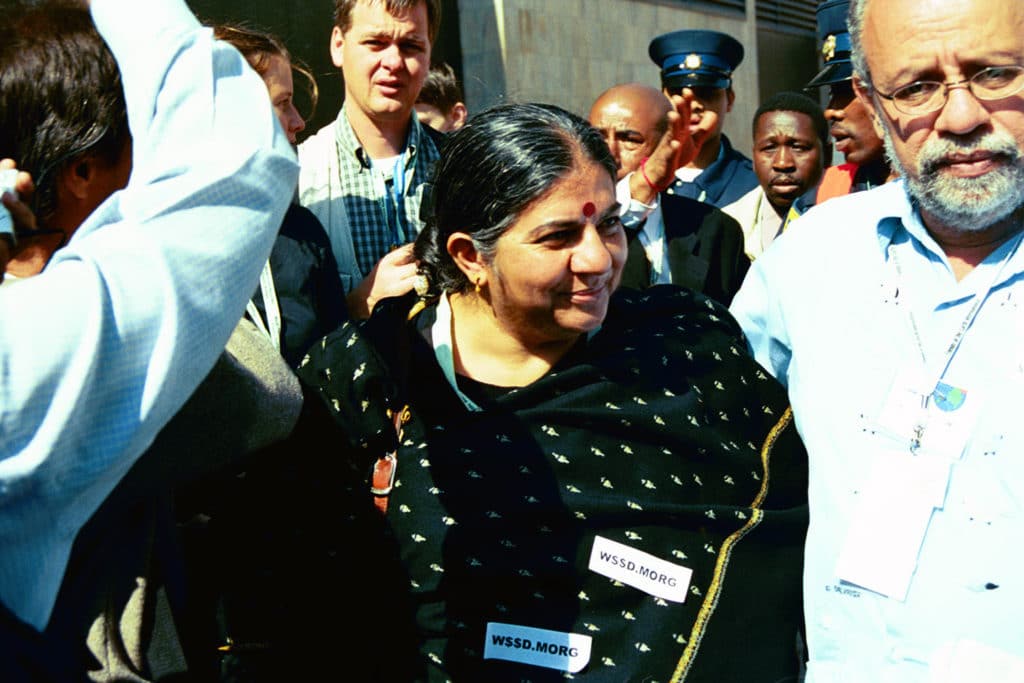
But while there’s a noticeable shift in public consciousness, behind the scenes Shiva says it’s a different story. “We’re living in two worlds,” she says. “Industrial agriculture, billionaires, big science, big food and big economy. And then real people. Real people see the connections, and more and more people think food is important.
“You are living through changes in GMO regulations. The Prime Minister’s [Boris Johnson’s] first speech mentioned ‘freedom for GM’. Not freedom for the farmers, or for the land, or for the animals, or children – it was freedom for corporations.
“Compared to when I started, we had no global corporations directly in India. But today in every part of the world they are the dominant force. It is a polarised world. A world of conscious people who would care for the Earth, care for the food they eat, and another world that would trash every bit of it as fast as they can.”
The ability to see the threat to people and planet from global business still feels like one of the most radical aspects of Shiva’s work. Where for most of us, big business is a largely invisible force driving our food supply chains, Shiva has always seen the links between food, farming, power and money. Today she feels it more than ever: “Things today, politically, economically, ecologically, are much worse than when I started,” she says.
“The world is rising. Except that governments have given up their responsibilities and are really an extension of the corporate rule. They are implementers of the corporate agenda. And you have corporations with total freedom. They have platforms, like the World Economic Forum, and that’s why people need to organise in new ways.
“The big change is that when we would do this work 10-15 years ago, or even 30 years ago, we would be able to write policy to make corrections. Because we had viable, democratic processes and we had decisions that were made by national parliaments.
Governments have given up their responsibilities and are really an extension of the corporate rule.
“And what globalisation did from ’91 onwards, it started the deregulation phase. And that deregulation today is reaching its absolute dead end. After this, there will be nothing to protect. So, it’s a challenge. We have to reinvent our democratic rights.”
Shiva’s position as a scientist from the global south also provides a perspective of clarity, especially when applied to the debate around the role of animals in farming.
Led by an urgency to reduce our impact on the planet, the mantra to eat less meat and dairy has taken off in the West in recent years, with extreme proponents like George Monbiot going as far as to advocate an end to all livestock farming.
Shiva, a lifelong and passionate champion of small-scale farmers, has little time for such views.
“I have the privilege of being from the South. And therefore every time a fake narrative is created that universalises a false message, I can see it. Just because you have a limited, myopic experience of an industrialised agriculture, it is flawed to extrapolate it to all cultures. It is flawed to imagine that the whole world is industrial, it is flawed to be blind to the amazing agriculture system of the South.”
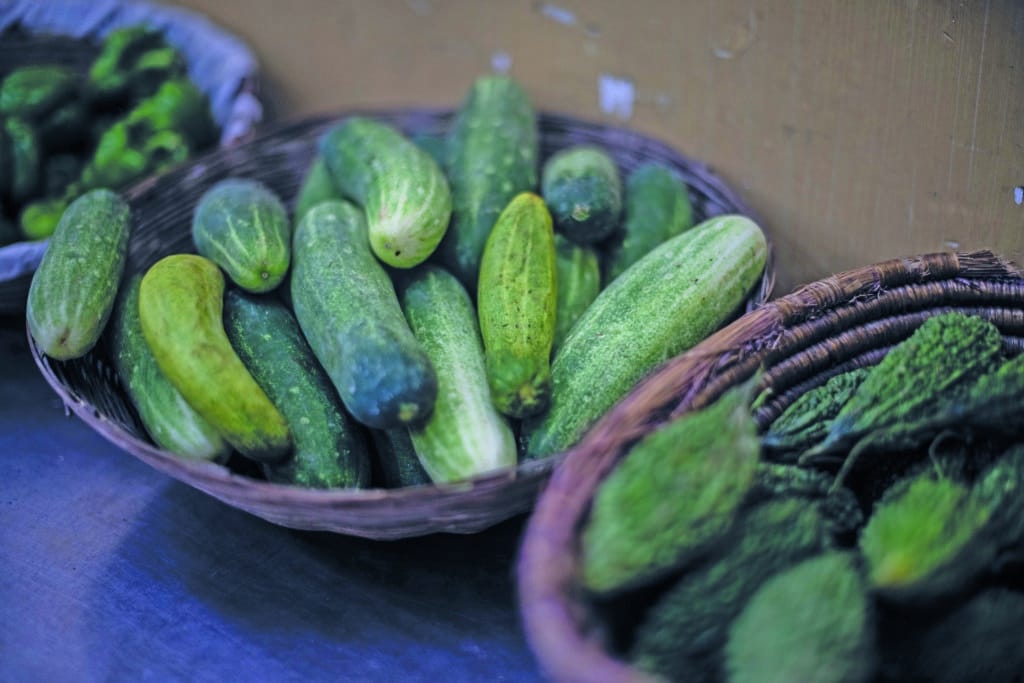
She sees other problems with Monbiot’s proposal to return farmland to nature in a mass rewilding, including the production of feedstocks for lab-grown food, as well as what she sees as Western colonial “arrogance” to impose solutions to problems it has largely created.
“You cannot be against industrial farming if you are for lab food. The feedstocks will come from hyper-industrial farming. I’ve got a report here quoting Bayer who are saying plant-based foods are a bigger opportunity for us,” she says. “So it is not the case that the land will be reclaimed. The land will see even bigger colonisation.
“Societies have spent centuries to evolve knowledge of food and farming. I have spent nearly four decades to understand, with humility. I see it as a new colonialism, only this time in a green cloak.”
From experience, she also worries about the presence of ‘paid’ science influencing policy. “Most papers in science and nature on these issues are industrial papers. So all you’re doing is replicating corporate lies. Just like there’s paid news. I have lived through it – there is paid science.
“I have witnessed the top scientists marginalised and pushed aside,” she continues, of scientists who saw early links between the herbicide glyphosate and cancer. They are now being vindicated, as court case bills against Bayer-Monsanto in the US add up, in compensation for diseases caused by the chemical.
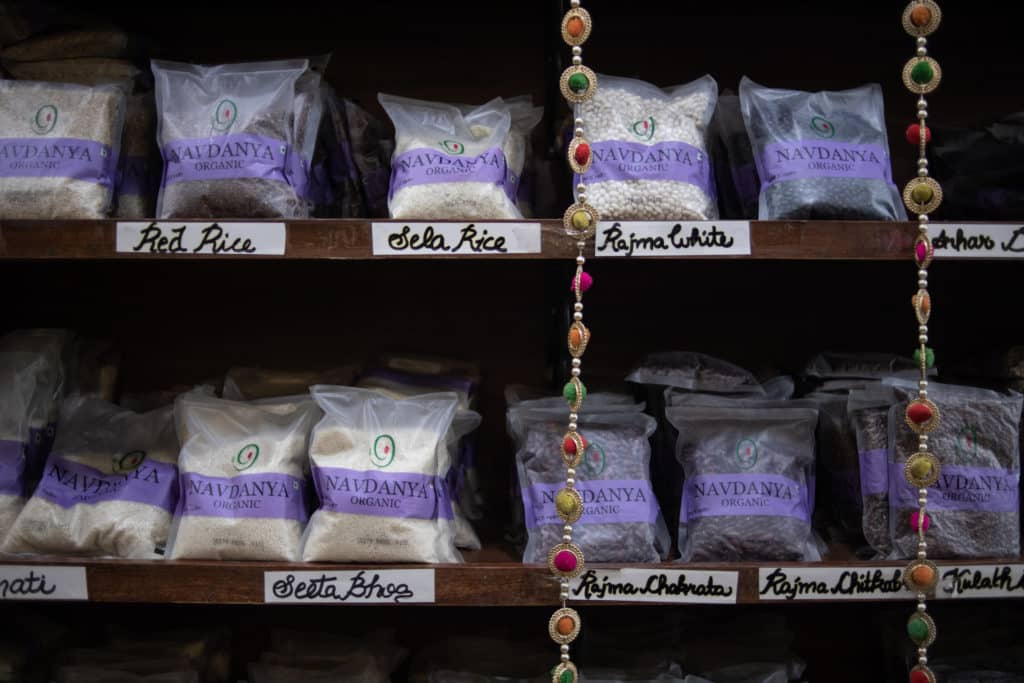
Speaking from her home in Delhi, Shiva shifts easily between the language of an experienced orator, an academic focus on detail, and the earth-centric connections between planet and people.
Born in rural India to a forester father and a mother who returned from a life of academia to work on a farm, she has perhaps been crossing these worlds since she was born. The interdisciplinary strength in her background is probably also one of the reasons she has been so hard to silence. And there have certainly been attempts to do so.
“Of course, they threatened me. And they still threaten me,” she says, of one of the most consistent threads in her career and a fierce determination to bring the power of the pesticide giants into the light.
In the autobiographical feature film The Seeds of Vandana Shiva, Shiva is described as “Monsanto’s worst nightmare” after suing the company for attempting to patent seeds in India, and consistently using her platform to bring its intentions and exploitation of farmers into the public domain.
I can call it cow dung, you can call it bullshit – it’s still good compost, the Earth will thank us.
“They have retreated from wanting to debate to basically now stabbing you in the back with whatever means they can,” she says. “They were more confident earlier; they could come out in the open and debate ideas and science. But I think they know they’ve lost that, and they can only do character assassination.”
One such example was the disappearance of her physics degree from her Wikipedia page – restored when her son posted the evidence, before immediately disappearing again.
Another time, a Monsanto lobbyist turned up after a press conference to present her with a handful of manure, calling it ‘the Bullshit Award for starving the world with organic’. “So I said ‘thank you, it will still make good compost. I can call it cow dung, you can call it bullshit – it’s still good compost, the Earth will thank us.’ And we had a compost ceremony,” she smiles.
The question over whether organic farming can feed the world is a common attack, which Shiva says has no basis but is easily propagated by “a paid article in Nature”. Recently, a long-running study found that nature-friendly farming does not reduce food production. Others have long pointed out the ecosystem benefits, such as repairing biodiversity and soil health, which organic farming provides. Meanwhile, the broader regenerative farming movement is helping to prove that plant diversity can replace chemical fertiliser at no risk to farmer livelihoods.
Less optimistic is the fact that, where fossil fuel giants like BP or Shell are well-known and regularly targeted by eco-activists, the agrichemical companies and big animal feed companies with huge control and footprints in the food sector have largely been allowed to stay in the shadows.
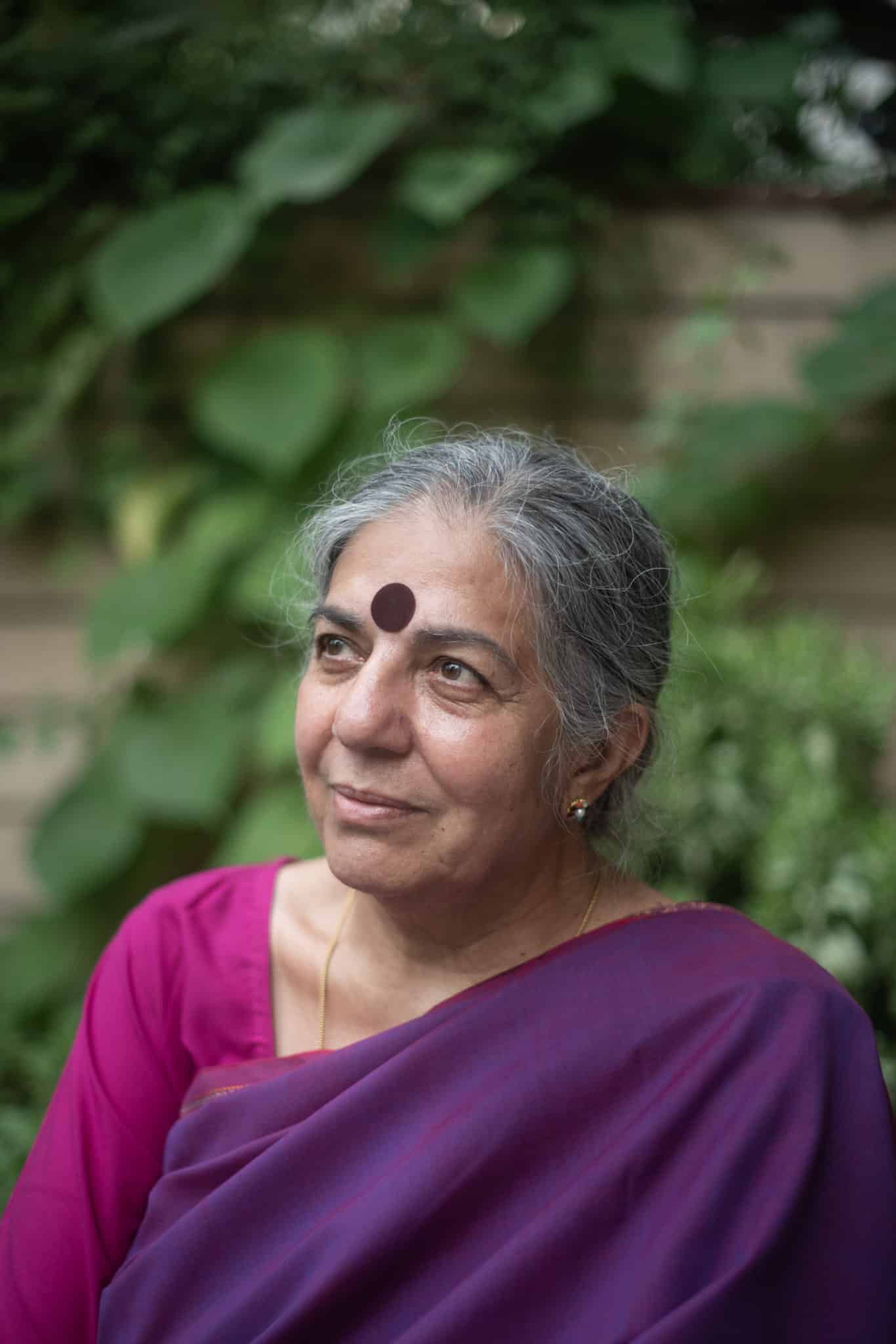
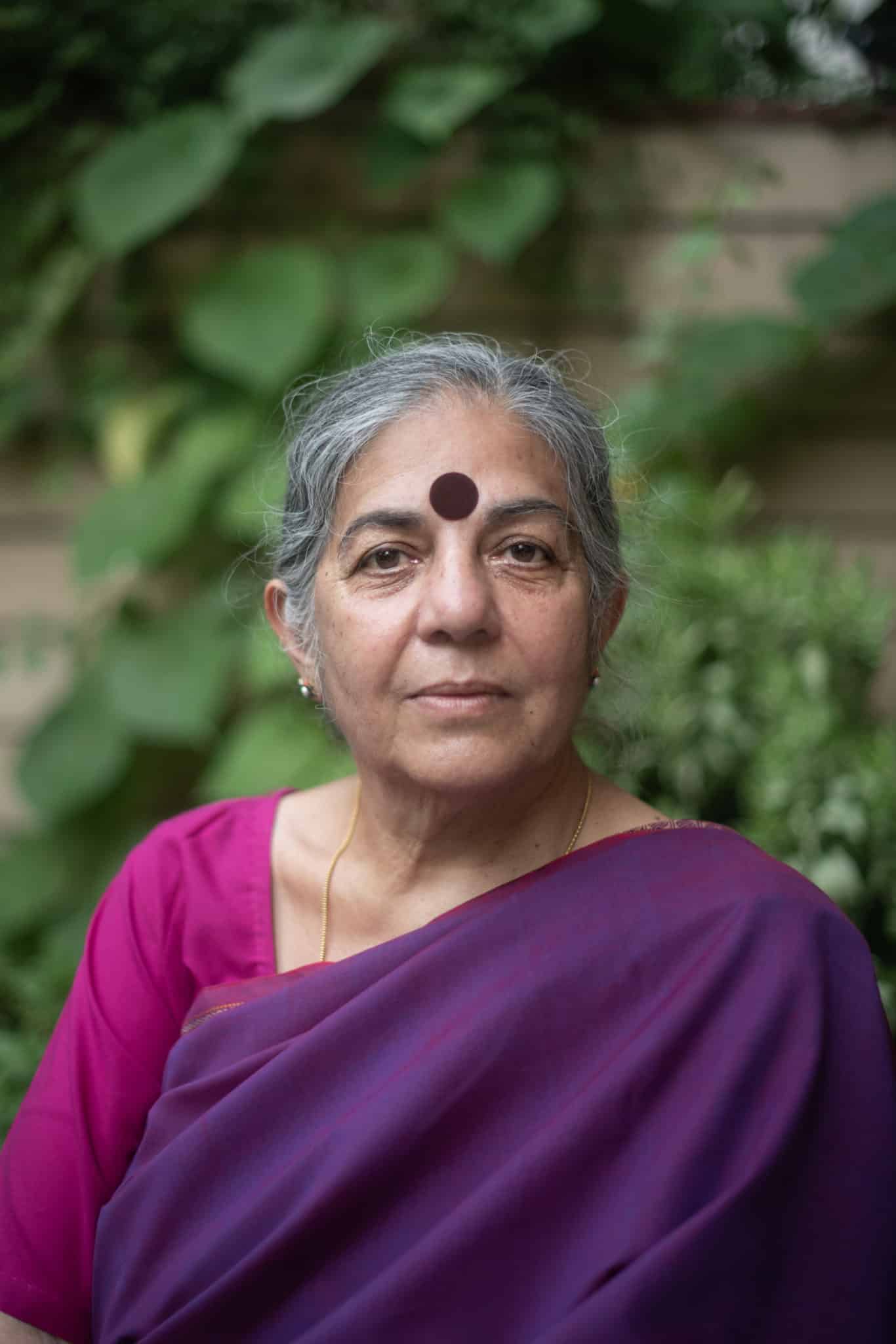
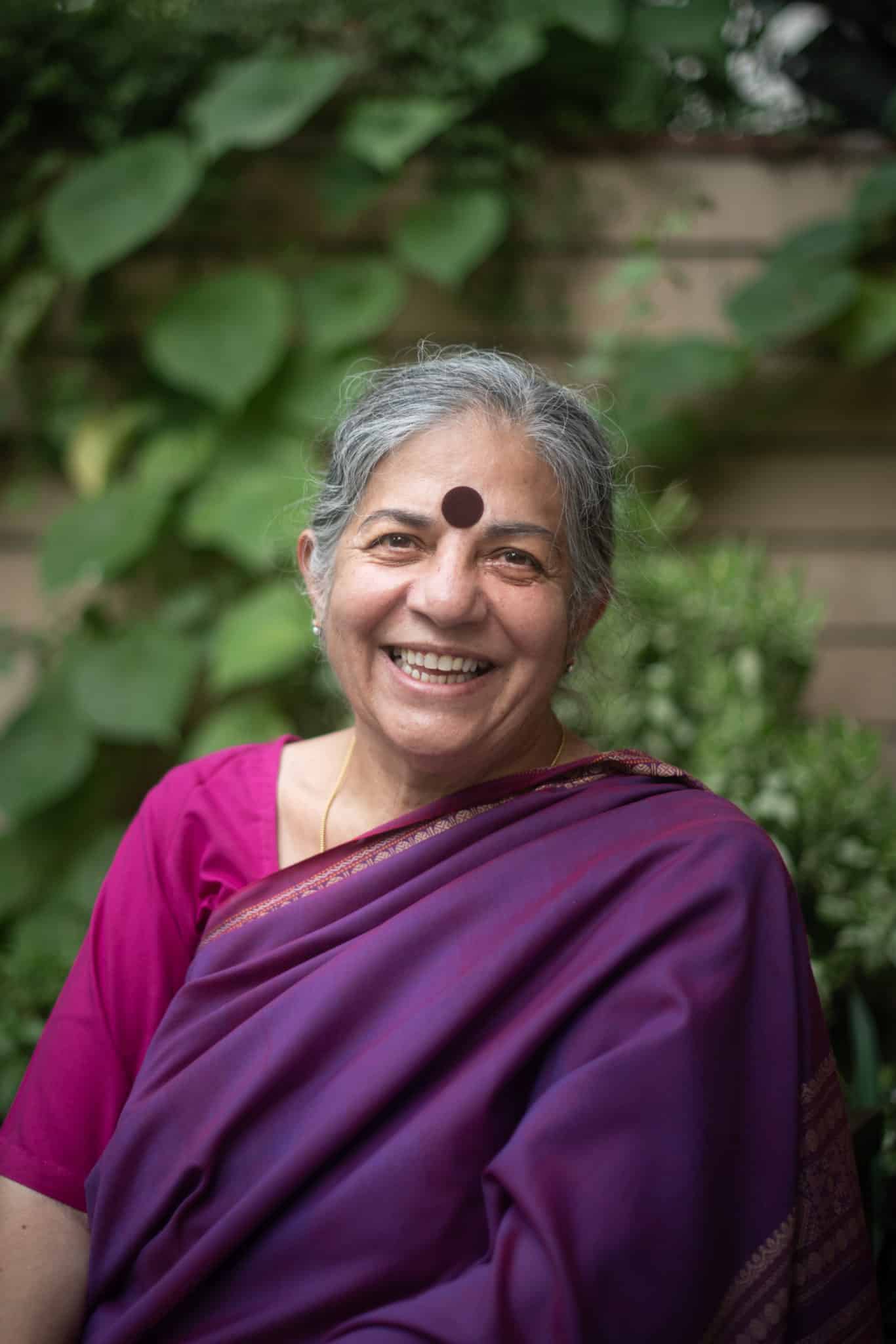
“The father figures of the environmental movement have not seen that industrial agriculture is fossil fuel agriculture,” says Shiva. “They’re willing to fight fossil fuels in your car, but they’re not willing to fight fossil fuels in your food. I think there is a failing there. A large part of the environmental movement has not extended the challenge to the oil industry in their incarnation as agribusiness. Because what is agribusiness? Industrial agriculture began with pesticides and fertilisers – where did they come from? Fossil fuels.
“It’s not that the knowledge is not available; at least five of my books have made that connection. I think part of it is we have let them off the hook,” she continues, sitting in front of a bust of her childhood physics inspiration Albert Einstein, which she sculpted while working with an artist during a brief ‘down’ period between degrees.
“I called them the ‘Poison Cartel’; the drivers of industrial agriculture. I have, through personal experience, as well as through my engagement of movements, seen that they are still what they were. That clique is still deciding what will happen with our food. The future is digital agriculture, farming without farms, driver-less tractors.”
Despite everything, Shiva remains hopeful and uses her outrage as fuel. “I’ve always looked for how bad things are and what I can do, and how can I work with others to spread hope. Not hope as an empty promise but as real action. I made a clear choice that I would act for the Earth, for justice, for things bigger than myself. I’ve lived through very difficult times, but I’ve never allowed the difficulty to be a reason for despair.”
Industrial agriculture began with pesticides and fertilisers – where did they come from? Fossil fuels.
For others with less time or dedication, she also believes that “in every place, there are many ways to make change”. “In some places it will be challenging laws, in some places it will be working with parliamentarians. There will be times when there’ll be a need for protest,” she explains.
Change can also come from connecting the city with the countryside, and using a local first (rather than local only) approach to food chains. “Every city has a food shed around it,” says Shiva, adding that she wants to reach outside the usual green sphere. “It’s time for us to put our hands out to the conventional farmers and say together we will protect the food, and together we will make the transition that will protect the Earth. People are not for agribusiness.”
As for Gandhi and inheriting his legacy, she doesn’t refute the link: “I’ve definitely learnt the issues of economic freedom from Gandhi,” she says. “The idea of saving seed as a response to GMO or patenting came from thinking: what would Gandhi do?”
Many of Shiva’s stories still resonate today, as issues around the right to food and who makes money from it are still very much alive. But where once she was fighting for the future of climate and nature, now those crises are happening in real time. And after years of being positioned as a radical eco-warrior trying to ‘starve the world’ and go back to the dark ages, ironically, Shiva’s long-held position in defence of farmers, citizens, and planetary care could not be more modern.
This interview was originally published in the Autumn 2022 print edition of Wicked Leeks. You can read the full issue online now.








The sense this woman talks is what is going to save the world.
It is up to everyone who disavows the current industrial agricultural system to step up and just say’ no’ – we didn’t vote any of these people into their positions of power. These men at the WEF and United Nations are unelected ‘leaders’ who are racing forward with their vision of a food system where robots do the farming, all nature is monetised under patent law and people will be given lab produced food to eat. Watch carefully how their agenda is fast tracking. Understand what the future will look like unless enough good humans say enough is enough. We want beauty in our lives and a meaningful existence.